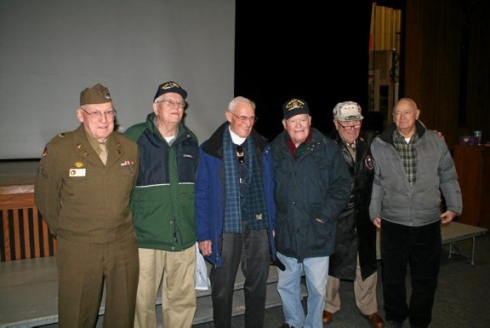History books have mentioned them ever since, said former Sgt. Major Warren Parks. He come from Lebanon and on Jan. 29, he was the master of ceremonies, as he attended the special program bringing together veterans from the Second World War and those who fought in the Battle of the Bulge.
The program offered an opportunity for students at Williams Valley, to hear about the sacrifices made, from the veterans themselves, through the 21st Century Learning Program. The vets were welcomed by High School Principal Tracey Weller. The 21st Century Learning Site Coordinator, Susan Diegert said they felt very honored to be in the presence of such great men of the Second World War.
The special guests at the event were Richard R. Pilon, Sr., 1948-49, Berlin Airlift; Emmett T. Lang, 1942-45, 84th Infrantry, U.S. Army, author; George Watson, 1942-45, 87th Infantry, U.S. Army; John E. McAuliffe, 1944-45, 87th Infantry, U.S. Army; George Shenkle, 1942-45, 508th Parachute Infantry, 82nd Airborne Division; and Warren Horn, 1948-52, U.S. Marine Corps.
Sgt. Major Warren Parks told a short story of the Battle of the Bulge, saying that Hitler knew what he had to do at that point in time and that he knew he had to start an offensive, so he came up with a secret plan, which he called “Watch on the Rhine”. Parks insisted that history is a thing for you to know and that if you don’t know history, you will just repeat the same dumb things over and over again, the Citizen Standard reports.
He said the Germans moved to a very forested area in Ardennes and that a list of clues showing that the Germans are moving, was ignored by the United States. He compared and described Hitler’s tactic with moving all the people and vehicles to San Diego, California, without anyone from California to know about the move.
After asking the students if the have ever written a book report during school, he turned around and pointed to the veterans sitting in front of him and said that “these are the guys they wrote the books about.”
Veterans spoke to the students and answered their questions throughout the program. Veteran McAuliffe said that children helped a great deal during the war, as they collected scrap metal and rubber tires, took the labels off cans, which men would collect in trucks and later use them to make airplanes.
//
